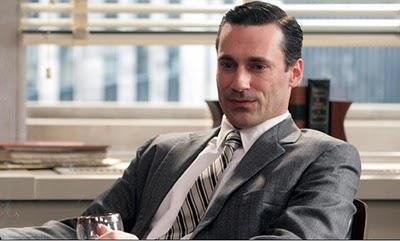 "How could anyone be unhappy with all of this"So says Don Draper, the debonair advertising executive for Sterling Cooper, one of the most successful firms on Madison Avenue. Yet under the surface of the characters on Mad Men, the brilliant series by Matthew Weiner, lies a melancholy and a desire for something other than the items they superficially promote. With the smell of change in the air, Sterling Cooper's executives are something of a dying breed as they drink, smoke, engage in infidelities, and occasionally put in some work hours and draw in clients while the women wish to succeed on their own but seem hopelessly dependent on men in a male dominated world. At the top sits Draper (Jon Hamm), a natural at his job and a good family man as well. Regardless, his beautiful wife (January Jones) seems unhappy, has childish tendencies, and has recently been placed in psychotherapy. He doesn't seem contented, and sees his way into the arms of a Greenwich village woman (Rosemarie DeWitt) who hangs around beatniks. Also, developments occur that suggest that he may not be who he says he is. Then there is Peggy Olson (Elisabeth Moss) the perky and intelligent secretary with greater ambitions but seems to fall prey to the advances of Pete Campbell (Vincent Kartheiser), the snaky junior executive who will stop at nothing for self-advancement. Overseeing are the partners Roger Sterling (John Slattery) and Bertram Cooper (Robert Morse), the former more concerned with boozing and womanizing and the latter a pragmatist and seemingly straight and narrow kind of guy. Mad Men is a show that is intimately familiar with its time and setting, and it shows in the resulting period detail. The actors are wonderfully cast and believable in their roles. It is brilliantly conceived and intelligently written and sets the bar for what primetime television should be.
"How could anyone be unhappy with all of this"So says Don Draper, the debonair advertising executive for Sterling Cooper, one of the most successful firms on Madison Avenue. Yet under the surface of the characters on Mad Men, the brilliant series by Matthew Weiner, lies a melancholy and a desire for something other than the items they superficially promote. With the smell of change in the air, Sterling Cooper's executives are something of a dying breed as they drink, smoke, engage in infidelities, and occasionally put in some work hours and draw in clients while the women wish to succeed on their own but seem hopelessly dependent on men in a male dominated world. At the top sits Draper (Jon Hamm), a natural at his job and a good family man as well. Regardless, his beautiful wife (January Jones) seems unhappy, has childish tendencies, and has recently been placed in psychotherapy. He doesn't seem contented, and sees his way into the arms of a Greenwich village woman (Rosemarie DeWitt) who hangs around beatniks. Also, developments occur that suggest that he may not be who he says he is. Then there is Peggy Olson (Elisabeth Moss) the perky and intelligent secretary with greater ambitions but seems to fall prey to the advances of Pete Campbell (Vincent Kartheiser), the snaky junior executive who will stop at nothing for self-advancement. Overseeing are the partners Roger Sterling (John Slattery) and Bertram Cooper (Robert Morse), the former more concerned with boozing and womanizing and the latter a pragmatist and seemingly straight and narrow kind of guy. Mad Men is a show that is intimately familiar with its time and setting, and it shows in the resulting period detail. The actors are wonderfully cast and believable in their roles. It is brilliantly conceived and intelligently written and sets the bar for what primetime television should be.
Entertainment Magazine
 "How could anyone be unhappy with all of this"So says Don Draper, the debonair advertising executive for Sterling Cooper, one of the most successful firms on Madison Avenue. Yet under the surface of the characters on Mad Men, the brilliant series by Matthew Weiner, lies a melancholy and a desire for something other than the items they superficially promote. With the smell of change in the air, Sterling Cooper's executives are something of a dying breed as they drink, smoke, engage in infidelities, and occasionally put in some work hours and draw in clients while the women wish to succeed on their own but seem hopelessly dependent on men in a male dominated world. At the top sits Draper (Jon Hamm), a natural at his job and a good family man as well. Regardless, his beautiful wife (January Jones) seems unhappy, has childish tendencies, and has recently been placed in psychotherapy. He doesn't seem contented, and sees his way into the arms of a Greenwich village woman (Rosemarie DeWitt) who hangs around beatniks. Also, developments occur that suggest that he may not be who he says he is. Then there is Peggy Olson (Elisabeth Moss) the perky and intelligent secretary with greater ambitions but seems to fall prey to the advances of Pete Campbell (Vincent Kartheiser), the snaky junior executive who will stop at nothing for self-advancement. Overseeing are the partners Roger Sterling (John Slattery) and Bertram Cooper (Robert Morse), the former more concerned with boozing and womanizing and the latter a pragmatist and seemingly straight and narrow kind of guy. Mad Men is a show that is intimately familiar with its time and setting, and it shows in the resulting period detail. The actors are wonderfully cast and believable in their roles. It is brilliantly conceived and intelligently written and sets the bar for what primetime television should be.
"How could anyone be unhappy with all of this"So says Don Draper, the debonair advertising executive for Sterling Cooper, one of the most successful firms on Madison Avenue. Yet under the surface of the characters on Mad Men, the brilliant series by Matthew Weiner, lies a melancholy and a desire for something other than the items they superficially promote. With the smell of change in the air, Sterling Cooper's executives are something of a dying breed as they drink, smoke, engage in infidelities, and occasionally put in some work hours and draw in clients while the women wish to succeed on their own but seem hopelessly dependent on men in a male dominated world. At the top sits Draper (Jon Hamm), a natural at his job and a good family man as well. Regardless, his beautiful wife (January Jones) seems unhappy, has childish tendencies, and has recently been placed in psychotherapy. He doesn't seem contented, and sees his way into the arms of a Greenwich village woman (Rosemarie DeWitt) who hangs around beatniks. Also, developments occur that suggest that he may not be who he says he is. Then there is Peggy Olson (Elisabeth Moss) the perky and intelligent secretary with greater ambitions but seems to fall prey to the advances of Pete Campbell (Vincent Kartheiser), the snaky junior executive who will stop at nothing for self-advancement. Overseeing are the partners Roger Sterling (John Slattery) and Bertram Cooper (Robert Morse), the former more concerned with boozing and womanizing and the latter a pragmatist and seemingly straight and narrow kind of guy. Mad Men is a show that is intimately familiar with its time and setting, and it shows in the resulting period detail. The actors are wonderfully cast and believable in their roles. It is brilliantly conceived and intelligently written and sets the bar for what primetime television should be.

